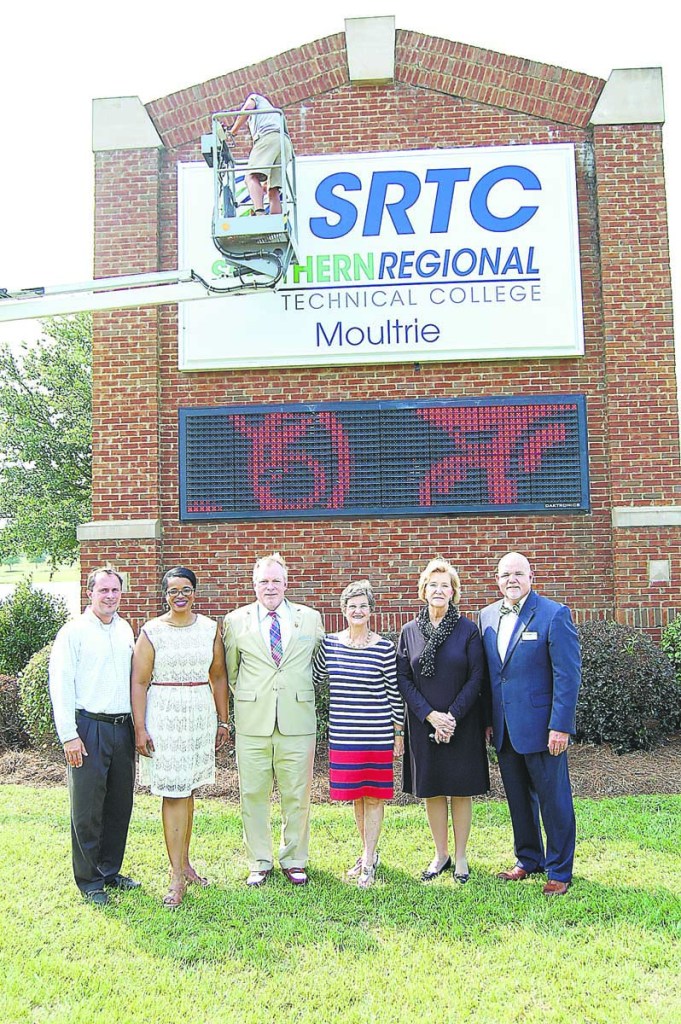Southern Regional Tech growth continues after merger
Published 9:50 am Wednesday, January 4, 2017

- Dignitaries helped Moultrie Technical College celebrate its transition to Southern Regional Technical College Wednesday, July 1, 2015, at the school’s Veterans Parkway campus in Moultrie. Signs with the new name were unveiled simultaneously at SRTC’s full-service campuses in Moultrie, Thomasville and Tifton. From left are community partners Darrell Moore, president of the Moultrie-Colquitt County Chamber of Commerce, and Lisa Clarke Hill, Moultrie city councilwoman; members of the college’s board of directors, Robby Pitts, Katrina McIntosh and Ellen Eaton; and SRTC Provost Jim Glass, formerly the acting president of Moultrie Technical College.
Editor’s Note: This is one of a series of stories looking back at significant progress in Moultrie and Colquitt County during 2016.
MOULTRIE, Ga. – When Moultrie Technical College and Southwest Georgia Technical College merged in July 2015, the newly formed Southern Regional Technical College bucked a trend that showed slight decreases in enrollment among Technical College System of Georgia’s merged schools.
Trending
Last spring, when comparing the combined enrollment numbers of the former MTC and SWGTC, the new college showed a slight increase.
And that trend continued for the Fall 2016 term.
SRTC was one of 11 colleges in the 23-school system to increase its total enrollment compared to the Fall of 2015.
Its total enrollment rose to 3,552 students overall, an increase of 1.3 percent. Its Full Time Equivalency (FTE) showed a 2.3 percent increase.
And with the Spring 2017 semester scheduled to begin on Jan. 9, SRTC officials hope that trend continues.
“For a college, increasing enrollment by any amount is no small feat,” SRTC President Craig Wentworth said in a recent press release. “The enrollment increases are good news for our college as we continue to become a larger and stronger institution.”
Trending
SRTC offers more than 148 degree, diploma and certificate programs and 27 general education courses that transfer to the University System of Georgia and 19 private colleges and universities in Georgia.
The University System of Georgia, Albany State University, Thomas University and Valdosta State University are SRTC partners.
The college has instructional sites in Ashburn, Cairo, Camilla, Moultrie, Thomasville, Tifton and Sylvester and is accredited by the Southern Association of College and Schools Commission on Colleges.
The Moultrie Veterans Parkway campus, the Thomasville campus and the Tifton campus are full-service locations, allowing students to have access to student affairs and enrollment services, academic offerings and adult education (GED).
The Moultrie-Industrial Drive site offers primarily industrial technology programs, such as welding and joining, HVAC and automotive technology.
Of the 3,552 students enrolled for the Fall term, 1,422 were enrolled through the Move on When Ready (MOWR) program that allows high school students in ninth through 12th grades to receive credit from their high schools and postsecondary credit hours from the College for the same course.
For those who qualify, there is no cost for MOWR classes or books.
SRTC has one of the largest MOWR enrollments in the system, with more than 1,100 enrolled last spring.
The college collaborates with Baconton Community Charter School, Bishop Hall Charter School, Cairo High, Colquitt County High, Mitchell County High, Pelham High, Thomas County Central High, Thomasville High, Tift County High, Tiftarea Academy, Turner County High and Worth County High.
Colquitt County High School has the largest number of dual-enrolled students.
“We value our partnerships with our area high schools and are committed to working with all stakeholders to strengthen those unions for future students,” said Joyce Halstead, SRTC Vice President for High School Initiatives. “The new program streamlines the process for both students and parents, allows high school students to earn college credit while working on their high school diploma and provides opportunities to explore high-demand career options.”
Also of interest to those in Colquitt County is the addition of the nursing program at the Moultrie and Tifton Campuses. The addition of the program could eventually double the number of nursing graduates the school produces each year.
“The expansion of the ASN (Associate of Science in Nursing) program will have significant impact on the shortage of skilled registered nurses not only in south Georgia, but throughout the state,” Annie McElroy, Vice President for Academic Affairs said in a recent release.
Last spring, the college added evening Esthetics classes and cosmetology classes at the Veterans Parkway site.
SRTC’s certified programs enable students to earn technical certificates of credit, diplomas or degrees in an array of career fields, including criminal justice; crime scene technology; fire science technology; land, forest and wildlife management technology, horticulture, firefighter training, early childhood care and education, paralegal studies and social work.
The college also continues to have an economic development team to provide customized training and workforce development programs.
For more information, log on at www.southernregional.edu or call 888-205-3449.


